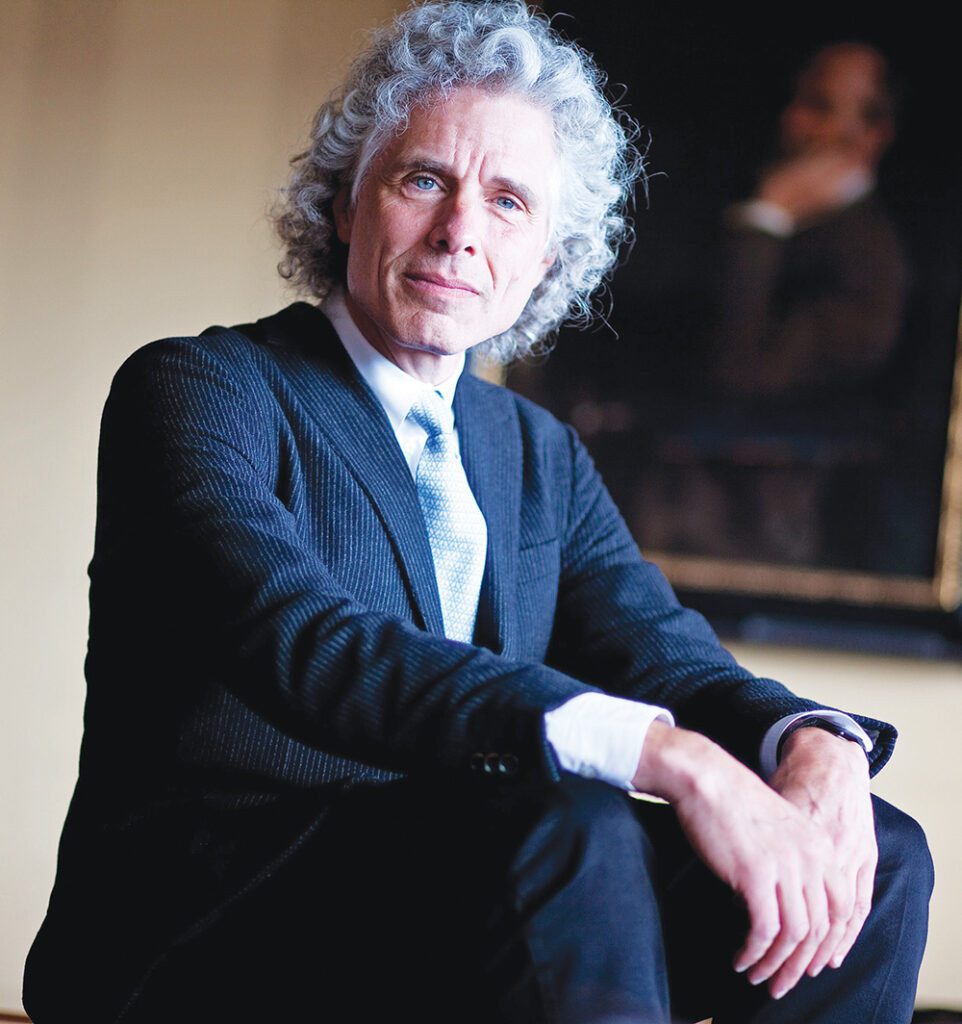
In Enlightenment Now: The Case For Reason, Science, Humanism, and Progress, evolutionary psychologist Steven Pinker defies the persistent drumbeat of negativity that floods our avenues of information.
Through six dozen graphs that break down the vitality of the human experience in the twenty-first century, Pinker has unequivocally demonstrated that life on planet earth has dramatically improved as a result of the Scientific Revolution and the widespread application of Enlightenment ideals to solve human problems.
We live longer. We are healthier and better-fed. We are safer and freer. We are smarter and have access to an unprecedented database of information; about our current world and the store of knowledge acquired over thousands of years.
200 years ago, more than 80 percent of humanity was illiterate; today, less than 20 percent. And in regions where illiteracy is a problem, the long-term trend favors its eventual demise.
A healthier and more knowledgeable humanity is much less likely to succumb to demagoguery that might destabilize society. “So much changes when you get an education!” Pinker exclaims. “You unlearn dangerous superstitions, such as that leaders rule by divine right, or that people who don’t look like you are less than human.”
Improvements in agriculture have dramatically reduced deaths from famine to a small fraction of the tens of millions who died from starvation in the twentieth century. Diseases that once ravaged entire populations are no longer imminent threats. In the developing world, the percentage of undernourished people has gone from 35 percent in 1970 to less than 15 percent in 2015.
Scientists of the late nineteenth forward have developed vaccines that literally saved billions of lives. “Smallpox” in the entry at Wikipedia is referred to in the past tense. “Scientific knowledge,” Pinker states bluntly, “eradicated… a painful and disfiguring disease which killed 300 million people in the 20th century alone.”
Enlightenment Now was published in 2018 so it does not refer to the 2020-21 Coronavirus pandemic. However, the rapid development of a number of highly effective and safe vaccines is just the sort of thing Pinker is referring to; using science to solve problems and improve the quality of life.
Despite massive wealth inequalities, we are, almost all of us, immensely richer. And with that wealth, we are much less likely to engage in large-scale wars and also poised to address the problems that threaten our environment. Pinker adds that liberal angst directed at billionaires is misplaced and that regulated free-market economies have been a boon to large swaths of humanity.
And, despite conservative lamentations about welfare states and the failure of socialism, nations across the world dedicate massive resources to lift up and heal the impoverished and, in the process, stabilize societies against decay. Although ungainly political divisions and the recent rise of nationalistic movements around the world seem to pose some nefarious threat, Pinker postulates that the tide of enlightenment is a virtually unstoppable phenomenon.
While dishing out criticism for both the far left and far right, the global and national trends—documented with clearly recognizable data—demonstrate the liberalizing of humanity. “[I]n every part of the world,” Pinker writes, “people have become more liberal. A lot more liberal: [many] young Muslims in the Middle East, the world’s most conservative culture, have values today that are comparable to those of young people in Western Europe, the world’s most liberal culture, in the early 1960s.” In the US, government programs such as Social Security and Medicare—whose initial introduction was met with claims of government overreach—are now practical realities of modern life. We are all liberals now, Pinker points out.
The expansion of democracy and protections for basic civil rights are now the norm rather than the exception. Even in areas where women and minorities face oppressions, the trend toward equality is remarkable. Most recently, over 90 percent of the world’s countries have decriminalized homosexuality. In this, it is helpful to understand that in 1945, over 80 percent of the world’s countries had laws against homosexual behavior. Indeed, our attitudes toward LGBTQ people have undergone such a rapid transformation that many of us now stand aghast at the discrimination which continues.
Pinker expands on this thought by pointing out that media reports exaggerate problems that are just not as pervasive as they appear. For instance, terrorism coverage makes it seem as if we all face the threat of attack. The reality is that people around the world are 130 times more likely to die from a simple accident like slipping in the bathtub than from a terrorism incident.
International organizations, global trade, and prosperity for many have stabilized the world. We are now living in a period known as the Long Peace (1945-2021). Conflicts today might count fatalities in the dozens whereas previous conflagrations between “great power” countries over the past several centuries measured the carnage in the thousands and the millions.
The threat of nuclear war has been placated for 75 years and, while about 15,000 warheads remain, only nine of the world’s nations possess nuclear weapons. This stands in stark contrast to doomsday scenarios circulated during the hottest moments of the Cold War. Further, attitudes toward nuclear weapons have begun to serve as a deterrent as their use today would be universally condemned.
Unsurprisingly, as different parts of the world have embraced reason over religiosity, the result has been an erosion of the mystical and dogmatic assessments of the human condition that prevailed only a few centuries ago. A rapidly growing portion of the population now claims no religious affiliation and many of those who continue to identify as religious participate for humanistic principles; that is, living a productive, healthy, and moral life without the threat of eternal damnation.
Yes, we continue to have problems. Yet, the unmistakable reality is—as the data proves—human beings on planet earth are safer, healthier, wealthier, more educated, and more tolerant.
So, the next time you check in on the news, don’t forget that life is good.




